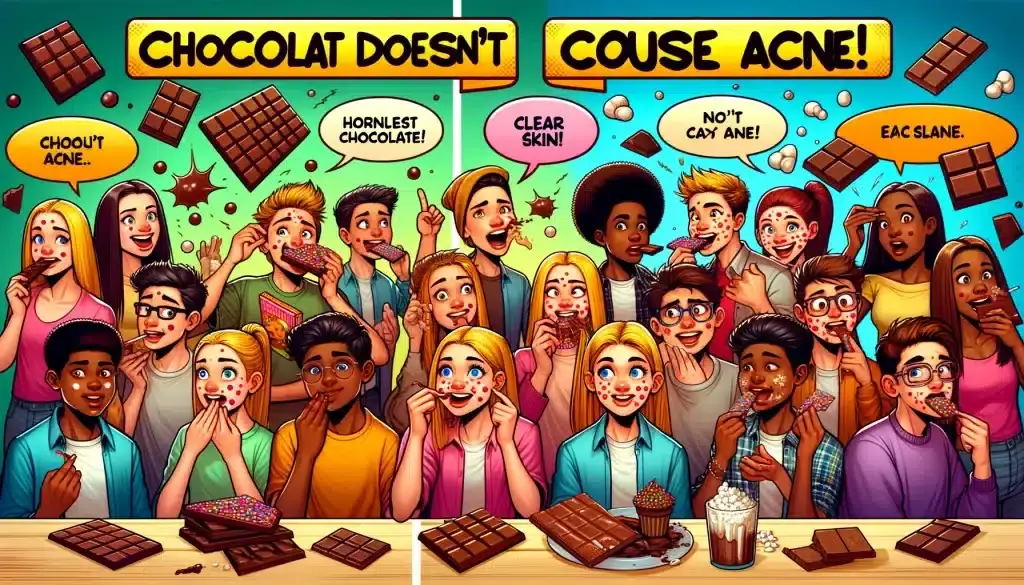Eating Chocolate Causes Acne. Chocolate is a beloved treat enjoyed by people all over the world. However, there has been a long-standing debate about whether or not eating chocolate causes acne. Some people believe that consuming chocolate can lead to breakouts, while others think that this is just a myth. In this article, we will explore the scientific evidence behind this claim and try to determine whether or not there is any truth to it.

Several studies have been conducted to investigate the relationship between chocolate consumption and acne. While some studies have found a link between the two, others have not. One study conducted in 2013 suggested that chocolate may increase the severity and frequency of acne breakouts by encouraging the immune system to react more aggressively to bacteria. However, other studies have found no significant association between chocolate consumption and acne.
Despite the conflicting evidence, many people continue to believe that eating chocolate causes acne. This belief may be due in part to the fact that chocolate is a high-glycemic food, which means that it can cause a spike in blood sugar levels. High-glycemic foods have been linked to inflammation and hormonal changes, which are both factors that can contribute to acne. In the following sections, we will examine the evidence in more detail to determine whether or not there is a causal relationship between chocolate consumption and acne.
Understanding Acne
https://www.youtube.com/watch?v=ys_R4KZYj24&embed=true
Acne is a common skin condition that affects millions of people worldwide. It occurs when hair follicles become clogged with oil and dead skin cells, leading to the formation of pimples, blackheads, whiteheads, and other types of lesions. Acne can be caused by a variety of factors, including hormones, genetics, and certain medications.
Sebum, a type of oil produced by the sebaceous glands in the skin, plays a major role in the development of acne. When sebum production increases, it can mix with dead skin cells and clog pores, leading to the formation of comedones (whiteheads and blackheads). These comedones can become inflamed and infected by acne-causing bacteria, leading to the development of pustules, papules, and other types of lesions.
Hormones also play a significant role in the development of acne. During puberty, for example, hormonal changes can cause an increase in sebum production, leading to the development of acne. Hormonal imbalances caused by certain medical conditions, such as polycystic ovary syndrome (PCOS), can also lead to the development of acne.
While chocolate has not been proven to directly cause acne, some studies suggest that it may exacerbate the condition in some people. Chocolate contains sugar, which can increase inflammation in the body and lead to an increase in sebum production. Additionally, milk chocolate contains whey protein isolates, which can bind to insulin-like growth factors and increase sebum production.
Overall, while the relationship between chocolate and acne is not fully understood, it is clear that a healthy diet and good skin hygiene are important for maintaining clear, healthy skin.
The Role of Diet in Acne
While the exact causes of acne are still not fully understood, many studies have shown that diet can play a significant role in the development and severity of acne. In particular, certain foods and dietary habits have been linked to increased inflammation, hormonal imbalances, and other factors that can contribute to acne breakouts.
One of the most well-known dietary culprits when it comes to acne is sugar. High-sugar foods like candy, soda, and other sweets can cause blood sugar spikes, which in turn can lead to inflammation and hormonal imbalances that can trigger acne. Additionally, sugar-rich foods can also contribute to the growth of acne-causing bacteria on the skin.
Milk and other dairy products have also been linked to acne in some studies. Some researchers believe that the hormones in milk can contribute to hormonal imbalances that can lead to acne, while others point to the high levels of insulin-like growth factor-1 (IGF-1) found in milk and other dairy products as a potential culprit.
In addition to sugar and dairy, other foods and dietary habits have also been linked to acne. For example, a diet high in refined carbohydrates and processed foods has been shown to increase inflammation and contribute to hormonal imbalances that can trigger acne. On the other hand, a diet rich in fruits, vegetables, and other anti-inflammatory foods, as well as omega-3 fatty acids found in fish and beans, may help reduce inflammation and improve overall skin health.
Overall, while diet is just one of many factors that can contribute to acne, it is an important one to consider. By making healthy dietary choices and avoiding high-sugar, high-carbohydrate, and processed foods, individuals may be able to reduce their risk of developing acne and improve their overall skin health.
The Connection Between Chocolate and Acne
There has been a long-standing debate about whether eating chocolate causes acne or not. While some people believe that chocolate can trigger acne breakouts, others argue that there is no scientific evidence to support this claim.
Several studies have investigated the link between chocolate and acne. One study found that after consuming 25 grams of 99 percent dark chocolate every day for two weeks, 25 acne-prone men had more acne. However, another study found no evidence that chocolate itself causes acne.
According to the Chocolate Manufacturers Association, the flavonoids present in chocolate may have anti-inflammatory properties that could help reduce acne. However, the sugar and fat content in chocolate, particularly in milk chocolate and other candy bars like jelly beans, may contribute to the development of acne.
Cocoa butter, which is present in most types of chocolate, is a highly comedogenic substance that can clog pores and lead to acne breakouts. Therefore, people with acne-prone skin should be cautious when consuming chocolate and choose dark chocolate with a high percentage of cocoa solids.
In conclusion, while there is no clear evidence that chocolate causes acne, some studies suggest that chocolate consumption may be linked to acne breakouts. People with acne-prone skin should be aware of the potential risks associated with consuming chocolate and choose their chocolate products wisely.
The Effect of Sugar and Fat on Acne

There is evidence that sugar and fat can contribute to acne breakouts. Sugar-rich foods, particularly those with added sugars, can cause blood sugar spikes and increase insulin levels, which can lead to inflammation and oil production in the skin. This can clog pores and result in acne.
Individuals who consume high amounts of carbohydrates, particularly those with a high glycemic load, may also be at risk for acne. Foods such as white rice and bagels can cause blood sugar spikes and increase insulin resistance, which can lead to acne.
Furthermore, dairy products that contain whey and casein, both of which can increase insulin levels, have been linked to acne in some studies. Research has also shown that a diet high in saturated and trans fats can contribute to acne.
It is important to note that not all individuals will experience acne from consuming sugar and fat. Age, genetics, and individual skin type can also play a role in acne development.
To reduce the risk of acne, individuals can limit their consumption of sugar-rich and high glycemic load foods, as well as saturated and trans fats. They can also incorporate foods that are rich in antioxidants and anti-inflammatory nutrients, such as fruits, vegetables, and whole grains, into their diet.
The Influence of Hormones and Age on Acne
Acne is a common skin condition that affects people of all ages, but it is most prevalent in teenagers. Hormones play a significant role in the development of acne, particularly androgens, which are male hormones that are present in both males and females. Androgens stimulate the production of sebum, an oily substance that can clog pores and lead to the development of acne.
During puberty, the body undergoes significant hormonal changes, which can lead to an increase in acne. As a result, teenagers are more likely to develop acne than adults. However, acne can also occur in adults, particularly in women. Hormonal imbalances, such as those that occur during pregnancy, can lead to the development of acne.
In addition to hormones, other factors can influence the development of acne. Insulin, for example, has been linked to the development of acne. Foods that are high in sugar and carbohydrates can cause a spike in insulin levels, which can lead to an increase in sebum production and the development of acne.
Stress can also play a role in the development of acne. When the body is under stress, it produces cortisol, a hormone that can increase sebum production and lead to the development of acne.
In conclusion, hormones, age, puberty, insulin, sebum, teenagers, and stress can all influence the development of acne. While acne is a common condition, it can be managed with proper skincare and treatment.
Scientific Studies on Chocolate and Acne

Numerous studies have been conducted to investigate the relationship between chocolate consumption and acne. One such study involved 25 acne-prone men who were given 25 grams of 99 percent dark chocolate every day for two weeks, after which they had more acne lesions than before. Another study found that an ounce of 99% cacao dark chocolate without added sugars or milk caused acne to worsen in acne-prone males.
The reason behind the link between chocolate and acne is still not completely clear. However, some experts suggest that the milk and sugar content in chocolate may be responsible for worsening acne. Whey protein isolates in milk bind to insulin-like growth factors, which can trigger acne.
To determine the effect of chocolate on acne, studies often use a control group that does not consume chocolate. In one study, college students who ate chocolate bars had more acne lesions than those who did not eat chocolate. However, the difference was not statistically significant.
Board-certified dermatologists suggest that while chocolate may not be the sole cause of acne, it can certainly worsen it. They recommend avoiding chocolate or limiting its consumption if you have acne-prone skin.
In conclusion, scientific studies suggest that there may be a link between chocolate consumption and acne. While the exact mechanism behind this link is not clear, experts suggest that milk and sugar content in chocolate may be responsible. It is recommended to limit chocolate consumption if you have acne-prone skin.
Dermatological Perspectives on Acne
Acne is a common skin condition that affects millions of people worldwide. Dermatologists are experts in treating acne and are often consulted by patients seeking relief from this condition. They are knowledgeable about the causes of acne, including the role that diet plays in its development.
While there is no conclusive evidence that eating chocolate causes acne, some dermatologists believe that certain types of chocolate may exacerbate the condition. Chocolate with high milk and sugar content, for example, can trigger acne breakouts in some people. This is because these ingredients can cause a spike in blood sugar levels, which can lead to an increase in oil production and inflammation in the skin.
Women are particularly susceptible to acne breakouts, especially during certain times of the month. Hormonal changes can cause an increase in oil production, which can lead to the development of acne lesions. Dermatologists can recommend treatments such as birth control pills or hormone replacement therapy to help manage hormonal acne.
The severity of acne can vary widely, from mild to severe. Dermatologists can assess the severity of a patient’s acne and recommend appropriate treatment options. Mild acne can often be treated with over-the-counter products, while severe acne may require prescription medication such as isotretinoin capsules.
Overall, dermatologists play a crucial role in helping patients manage their acne and maintain good skin health. They can provide expert advice on diet, skincare, and treatment options to help patients achieve clear, healthy skin.
Lifestyle and Acne
https://www.youtube.com/watch?v=PeefJO1ImBw&embed=true
Acne is a common skin condition that affects millions of people worldwide. While there is no one definitive cause of acne, many factors can contribute to its development. One such factor is diet. Eating chocolate and other sugary foods has long been thought to cause acne. However, the relationship between diet and acne is complex, and more research is needed to fully understand it.
Maintaining good hygiene is also important in preventing acne. Washing the face twice a day with a gentle cleanser can help remove excess oil and dirt that can clog pores and lead to breakouts. Using non-comedogenic skincare products can also help prevent acne.
Keeping a food diary can be helpful in identifying foods that may trigger acne. While there is no one-size-fits-all approach to a healthy diet, consuming a balanced diet that is rich in fruits, vegetables, and whole grains can help promote overall health and may also benefit the skin.
Drinking plenty of water is also essential for maintaining healthy skin. Water helps keep the skin hydrated, which can help prevent dryness and flakiness that can make acne worse.
Stress can also play a role in acne development. When a person is stressed, their body produces hormones that can increase oil production and inflammation, both of which can contribute to acne. Managing stress through techniques such as meditation, exercise, and deep breathing can help reduce the risk of acne.
In conclusion, while eating chocolate and other sugary foods may contribute to acne development, it is just one of many factors that can affect the skin. Maintaining good hygiene, keeping a food diary, consuming a healthy diet, drinking plenty of water, and managing stress are all important steps in preventing and managing acne.
Conclusion

The relationship between chocolate consumption and acne has been a topic of debate for many years. Some studies suggest that chocolate may increase the severity and frequency of acne breakouts, while others show no link at all.
However, dermatologists agree that a healthy diet is essential for maintaining good skin health. It is recommended that individuals consume a balanced diet rich in fruits, vegetables, and omega-3 fatty acids, while limiting their intake of processed foods, refined carbohydrates, and added sugars.
While there is no clear evidence that chocolate causes acne, it is important to note that excessive consumption of high-sugar and high-fat foods can lead to blood sugar spikes, insulin resistance, and inflammation, which may exacerbate skin conditions such as acne.
Furthermore, dairy products, which are often found in chocolate, have been linked to acne in some studies. It is recommended that individuals with acne-prone skin limit their intake of dairy products and opt for alternatives such as almond or soy milk.
In conclusion, while the relationship between chocolate and acne is not fully understood, it is important to maintain a healthy diet and limit the consumption of high-sugar and high-fat foods. Individuals should also practice good hygiene, manage stress levels, and seek advice from a board-certified dermatologist if they have persistent skin problems.
Steve is the creative force behind My Unique Tales, a blog dedicated to sharing captivating stories that explore the human experience in all its complexity. With a passion for writing and a talent for crafting engaging narratives, Steve's blog is a treasure trove of imaginative tales that transport readers to other worlds and challenge them to see things from new perspectives. From epic adventures to intimate character studies, Steve's stories are always thought-provoking and emotionally resonant. With a growing following of readers who appreciate his unique voice and creative vision, Steve is quickly becoming a rising star in the world of online storytelling.






